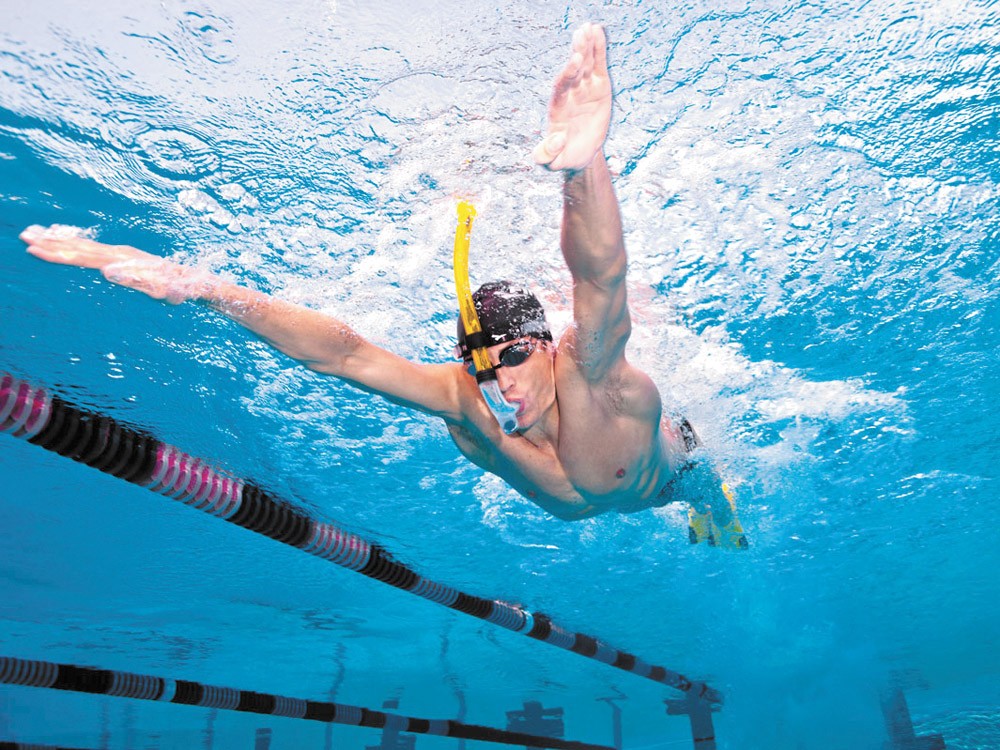This home has housed Olympians and Olympic hopefuls. It has housed collegians. It fronts onto Medical Lake. There are extra trunks for anyone who wants to take a swim.
Swimming is what people do here.
Diane Giebel-Nuess stood at her kitchen counter last Thursday, surrounded by friends, talking about the way the sport has changed since 1968, when she swam the 200-meter breaststroke in the Mexico City Olympics at age 15. “When I swam they didn’t even have goggles,” she says, “I hate to tell you that.” She says a lot has changed since then.
Across the bar-top from Diane, Todd Marsh swivels languidly on a stool, absorbing the memories. Marsh is today’s person of honor — coach of the Spokane Area Swim Team, soon to move away for a new job.
One of the things Marsh says has always loved about swimming, even as “a scrawny kid with average athleticism,” is how egalitarian it can be, giving those of less than jock-ish body types a sporting chance if they’re just willing to do the work.
Marsh says the work is everything, and the Olympics are a microcosm for the whole sport. You put in tremendous amount of time — years’ worth — for a few seconds of competition. And the notoriety you get, if you get any at all, is even more fleeting. “You get your satisfaction from your own improvement,” Marsh says, “You don’t get the recognition. You have to be self-driven.”
For a brief time every four years, we become enthralled by a sport we don’t really understand. Form is absolutely key, Marsh says, the thing that turns awkward kids into pool jocks. “Reducing drag in the water,” he says, “Being as efficient with each stroke as possible.“ This takes years of 5-hour days in the pool.
“Swimming has five competitive strokes but only four have races,” Marsh says, “The fifth is the underwater dolphin kick,” which allows swimmers to maintain their speed and extend their range underwater after kicking off the wall on a turn.
It’s indispensable, but unless there are cameras underwater, it’s a kick spectators never see. That makes it an apt metaphor for what makes a successful swimmer.
They do their hardest work where no one sees them.
Marsh started swimming as a child in California. When his family moved to Gillette, Wyoming, though, the town didn’t even have a pool, so Marsh’s dad shuttled Marsh 68 miles to the nearest pool at a motel in Buffalo. “An hour and a half there,” Marsh says, “swim for an hour. An hour and a half back. Marsh still managed to swim in the junior nationals and in college, at the Division II Nationals, swimming for Western Illinois University, where he met his future wife, Vicki. He and Vicki came to Spokane in 1988.
In his 24 years here, Marsh says he has graduated between eight and 15 swimmers a year and about 75 percent of those have gone on to swim in college. That’s not bad for a region with only one high school swimming program.
And because there’s so little recognition of the sport from outside, swimming families tend to stick together, Marsh says. “We all helped raise our kids together. We were brothers and sisters even though we were competitors.”
Marsh moves between present and past tense as he reflects on the team he has coached for the last 24 years, as though the reality of his departure — for Boise, to “take on a new challenge, coaching a bigger team” at the YMCA team there — hasn’t set in.
Or
perhaps because, even though he and Vicki are leaving, part of them
will stay behind. “Both of my kids were born here, both swam on the team
here,” Marsh says. “All the people I’ve coached here I still consider
family.






















